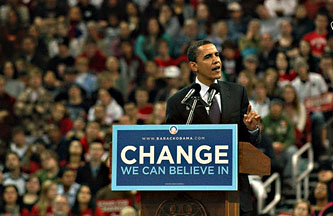 A reader emails to say he just came back from a town hall meeting in his district and came away wondering if Obama might have bitten off more than he could chew:
A reader emails to say he just came back from a town hall meeting in his district and came away wondering if Obama might have bitten off more than he could chew:
It occurred to me that one of the things that helps the opponents of health reform is the complexity of the issue — big omnibus bills give opponents all sorts of opportunity to deceive. Moreover, there’s a tipping point with big bills: if you try to get everybody on board by giving everyone something they want in exchange for something they don’t want, you can sometime get a big program passed. But if the various interests decide they’re better off without the bill, then the enemies just accumulate.
Under the circumstances, sometimes it’s better just to try and eat the elephant one bite at a time — a series of bill over the first term that would whittle things down to size:
An initial bill would provide for community rating and pre-existing condition protections. This bill would have the opposition of the insurance industry, but everyone else would be for it.
After you get that done — individual mandate, small business coverage requirements, assistance to those with lower incomes for purchase. Small business would be against this part, but all those insurance lobbyists would be on board.
This is a defensible position, but I think it’s also an example of a “grass is greener” approach to political process that’s much too common. Basically, whenever something is in trouble, people start to think that it would have worked if only we’d approached it in just the opposite way.
So Clintoncare failed because it was written in the White House and dumped in Congress’s lap. Won’t make that mistake again! Opponents are vilifying cherry-picked provisions of the House bill? A watered-down bipartisan compromise would have had a better chance. A big omnibus measure is in trouble? We should have broken it into pieces.
Maybe so. But I think this overrates process. The opposition is always going to oppose, and they’re going to find a way to oppose effectively no matter what you do. If the White House creates a bill, it was “written in secret.” If Congress does it, it’s a pork-filled monstrosity. Write a liberal bill and you’ll lose centrist Republican support; write a compromise bill and you’ll lose Democratic support. Write a big bill and it’s confusing; write a bunch of little bills and you expend all your political capital on trivia and never get anything done.
Good presidents understand process and use it to their advantage. But one way or another, you have to have the votes. And one way or another, healthcare won’t really be reformed unless, eventually, we pass something big. We’ve been passing piecemeal legislation for a long time, and it just hasn’t added up to much. So every 20 years or so we need to take another crack at serious reform, and every 20 years or so we’re going to learn the same lesson: if the public is on our side, we’ll be able to pass something. If we can’t get them on our side, we won’t.
For my money, the current bills wending their way through Congress are about as small as you can get and still call them serious healthcare reform. If we can’t pass some version of what’s on the table now, there’s really no reason to think that Obama has the political capital to pass it little bits at a time as his popularity inevitably wanes throughout his term. It’s now or never.













